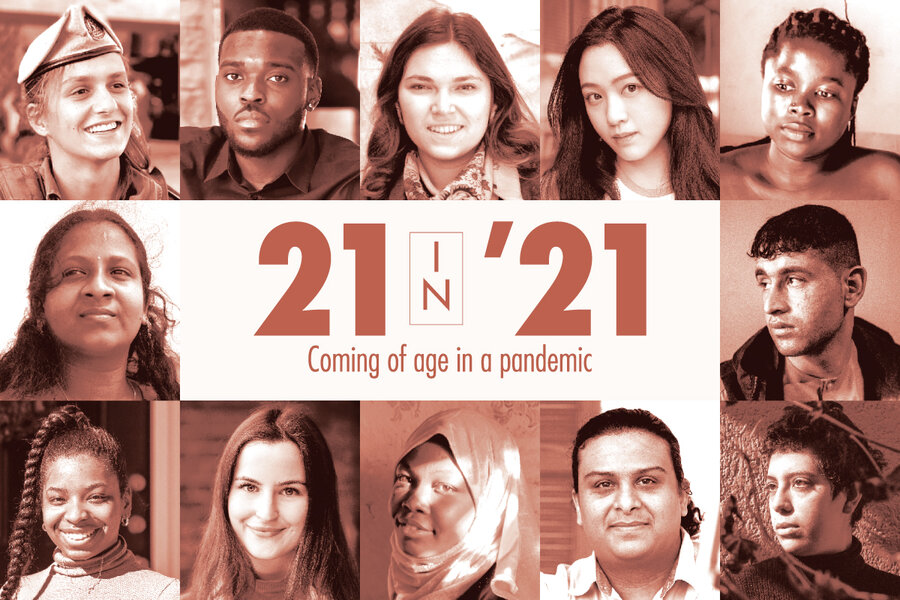A young generation stalled but ready to launch: A special global report
Loading...
| Johannesburg
What defines a generation?
Often, experts say, members of a generation are defined by the events that shaped their lives as young adults.
“World events like wars and recessions and pandemics and racial unrest can be especially formative,” says Meg Jay, a psychologist and author of “The Defining Decade: Why Your Twenties Matter – and How to Make the Most of Them Now.” “Because our 20s are [often] when we have our first jobs and first relationships and first moves and first real-world experiences, these big events become important parts of our life stories. They become woven into who we are.”
Why We Wrote This
Wars, economic depression, natural disasters, and a pandemic can define a generation. A globe-spanning Monitor project explores the daily challenges and existential struggles of twelve 21-year-olds negotiating today’s global health crisis to offer insight on how this generation may fare in the future.
In 2020, it was a pandemic.
For the last three months of 2020, the Monitor followed twelve 21-year-olds from around the world. We wanted to understand how this global health crisis is encoding itself in the cultural DNA of a generation coming of age in its shadow. The full project features six of these young people in-depth and all 12 speak for themselves in essays of their own.
Their lives and circumstances as they rolled into 2021 varied wildly, from a Sudanese refugee training to be a beautician in Jordan to a student preparing to be a labor organizer in Germany to a blind Iraqi refugee studying criminal psychology in Boston. Globally, indeed, being 21 itself meant very different things. In Israel, it’s the year many young people finish mandatory military service. In the United States, it’s the legal drinking age; in South Africa, it’s about the age at which a woman has her first child.
But the lives of the 21-year-olds we met had many striking similarities.
In isolation, for instance, the internet was their collective lifeline to the world. In Mexico, an art student isolating in her family home posted a daily piece of art to Instagram to remind herself that time had not stopped altogether. In Germany, the budding labor organizer negotiated contracts and planned strikes via Zoom. But online connections are fragile. In India, an engineering student missed being recruited by a major IT company after her internet cut out as she took a qualifying exam online.
By the end of 2020, many of the world’s 21-year-olds had lost jobs; others wondered if they’d ever find one. In the U.S., youth unemployment doubled between July 2019 and July 2020, with Gen Z both disproportionately affected by job cuts and disproportionately cynical about their economic future compared with older generations, according to a Pew Research Center report. The portion of people between 15 and 24 who were unemployed reached 20% in several European nations.
In France, the Monitor followed a 21-year-old entrepreneur who saw his plans to start a talent agency and online shopping portal stalled by lockdowns and economic downturn. In China, our 21-year-old watched as potential internships for her business degree were canceled, rendering her future increasingly uncertain.
More generally, the faith of the world’s 21-year-olds – in God and government and the goodness of people around them – wobbled, though it did not always break. Many felt torn between the reckless optimism of being young, healthy, and alive and the rigid caution demanded by a deadly virus. A few got sick themselves, and stood by helplessly as others more vulnerable around them did too.
Each of their stories was also, profoundly, their own. In Afghanistan, a boxer hoping to turn pro contemplated, for the second time in a year, paying a smuggler to help him get to Europe. In the U.S., a young Black woman, feeling caught between childhood and adulthood, watched a video of a police killing of a Black man spark national racial reckoning – a reckoning she could have a say in with her first presidential vote. In India, the engineering student waited out lockdowns folding origami flowers in the two-room flat she shares with her mother, daydreaming about the day she’d graduate and begin helping her mom pay off debt. In Jordan, the Sudanese refugee wandered from hair salon to hair salon, trying to get hired to do a job – making women look glamorous – that the world no longer seemed to need.
The pandemic opened fault lines, and stressed old ones. In India, Jordan, and South Africa, our 21-year-olds wondered how they’d scrape together enough money for mobile data for online studies. In Mexico, Canada, and Germany, 21-year-olds reflected on loneliness as a privilege – that they were alone because they could isolate, their lives not dependent on doing otherwise.
We found a generation suspended between the world they’d grown up in and uncertain arrival of their future.
Sowmiya Ashok in Chennai, India; Lenora Chu in Berlin; Colette Davidson in Paris; Whitney Eulich in Mexico City; Dina Kraft in Tel Aviv and Kibbutz Sa’ad, Israel; Sara Miller Llana in Peterborough and Parry Sound, Ontario; Taylor Luck in Amman, Jordan; Ken Makin in Evans, Ga., Hidayatullah Noorzai in Kabul, Afghanistan; Scott Peterson in London; Noah Robertson in Lowell, Massachusetts; and Ann Scott Tyson in Seattle contributed reporting to this article.







